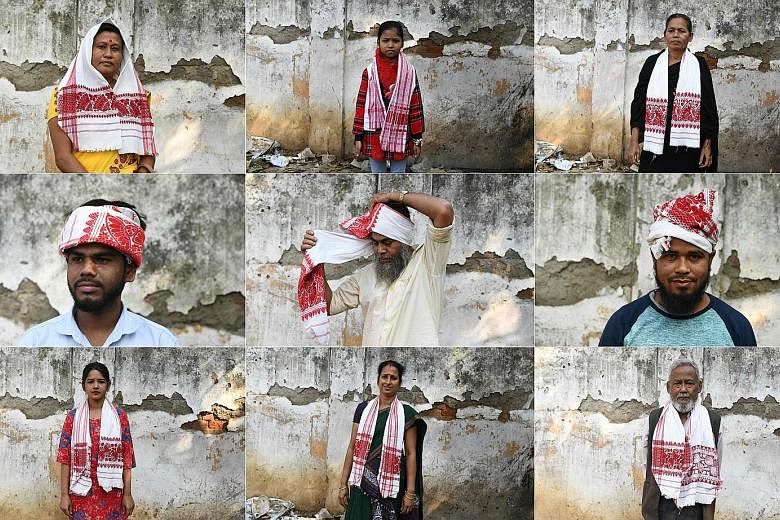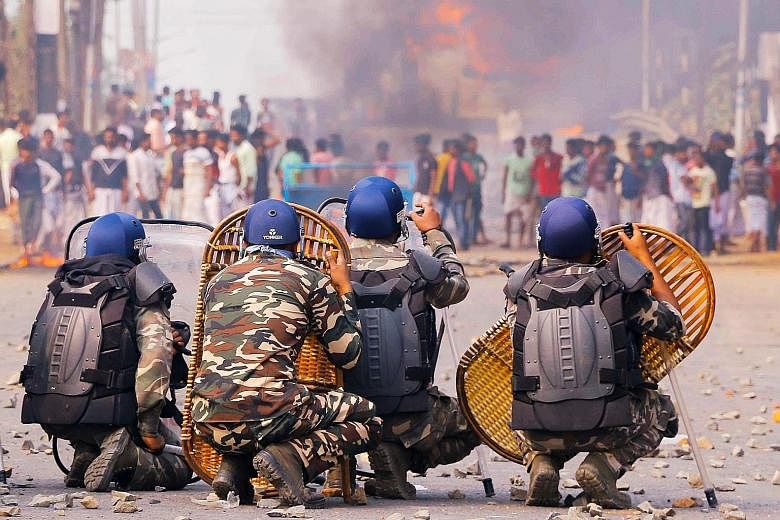NEW DELHI • A new law on Indian citizenship is threatening to pull Prime Minister Narendra Modi's focus away from a flagging economy as protests and criticism build against the divisive plan.
The government was forced to call in the army to quell protests in some parts of the country last week after Parliament passed legislation that will prevent undocumented Muslim migrants from three neighbouring countries from becoming citizens.
Demonstrators in eastern India set fire to buses and vandalised railway stations yesterday, as violent protests against the new citizenship law continued for a fourth straight day.
The change to the law has been criticised by opposition parties as well as by a US federal commission, who say India is moving away from the values of its secular Constitution.
"There is an economic cost attached to all this, given all the violence that is taking place," said Mr Amitabh Dubey, an analyst at TS Lombard in New Delhi.
Mr Modi's Bharatiya Janata Party is fulfilling the promises made to supporters who brought it back to power with a bigger mandate and "it isn't surprising that they have dropped the ball on turning around the economy and focusing on delivering what they think is more important and which will reap political dividends for them".
Less than a month ago, Mr Modi's government was ramping up programmes to help boost economic growth from a six-year low of 4.5 per cent. His administration announced the biggest privatisation drive in more than a decade, weeks after cutting corporate taxes by US$20 billion (S$27 billion) and taking steps to prop up weak banks.
At the same time, the Reserve Bank of India has cut interest rates five times this year to support growth. Still, there is little sign of a revival, with consumer demand and investment remaining weak.
"The focus on the social agenda has come at the expense of the economic agenda," Mr Akhil Bery, South Asia analyst at risk consultancy Eurasia Group, wrote in a note. "The government has been relying on the Reserve Bank of India to cut interest rates in order to boost liquidity in the system, but has, so far, not focused on major economic reforms to cut red tape and boost investment."
The door for further central bank rate cuts is closing, with policymakers about a week ago keeping interest rates unchanged after a spike in inflation took them by surprise.
The protests over the citizenship law risk taking the government's attention away from immediate problems facing the economy.
Unemployment is at a more than four-decade high, a drag on consumer confidence and spending.
Finance Minister Nirmala Sitharaman met reporters on Friday to share the progress on government measures to revive consumption, but parried questions on whether the slowdown has bottomed out.
"I am not engaging in predicting where the economy is right now, but I am focusing on working to address issues," Ms Sitharaman said.
The new law "takes the focus away from important economic issues", said economist Prabhat Patnaik.
"The more you have disruptions to normal life, the more the impact on economy and production."
Yesterday, protesters torched at least 15 buses on an expressway in West Bengal state, about 20km from state capital Kolkata, holding up traffic for several hours, said police.
At least half a dozen railway stations in the state were vandalised and set on fire, leading to the cancellation of many long-distance trains, Mr Sanjoy Ghosh, chief public relations officer at South Eastern Railway told Reuters.
In Uttar Pradesh state, students at the Aligarh Muslim University protested against the citizenship law and were mobilising Muslims via doorstep invitations for a bigger protest today.
BLOOMBERG, REUTERS
Singapore issues travel advisory for N-E India
Singapore's Ministry of Foreign Affairs (MFA) yesterday issued a travel notice for north-east India, urging Singaporeans to exercise "vigilance and caution", following reports of violent protests in the region.
The protests follow the approval of legislation that many in the far-flung north-east believe will give citizenship to large numbers of immigrants from neighbouring Bangladesh.
"Travel conditions are difficult due to street protests and cancellation of some flight and train services. Mobile data has also been restricted in some areas," said the MFA.
As a result, affected Singaporeans are advised to check with their travel agents on the latest situation and allow more time for travel.
Due to the evolving situation, Singaporeans should keep themselves updated on the latest developments through the local news and take all necessary precautions to ensure their safety, including avoiding areas with crowds, added the MFA.
Singaporeans in India are also urged to e-register with the MFA at https://eregister.mfa.gov.sg
As protests against the new citizenship Bill raged for the fourth straight day, Washington and London also issued travel warnings.
In Guwahati, the epicentre of the protests, two people have been shot dead and 26 hospitalised last week after security forces fired blank and live rounds, medical staff said.
The funeral procession of 18-year-old Sam Stafford, who was killed in the firing, took place on Friday and was attended by hundreds of angry and distraught mourners.
The Citizenship Amendment Bill allows for the fast-tracking of applications from religious minorities from Pakistan, Afghanistan and Bangladesh, but not Muslims.
For Islamic groups, the opposition and rights organisations, it is part of Prime Minister Narendra Modi's "Hindutva" Hindu nationalist agenda to marginalise India's 200 million Muslims.
He denied this and said that Muslims from the three countries are not covered by the legislation because they have no need for India's protection.
AGENCE FRANCE-PRESSE


